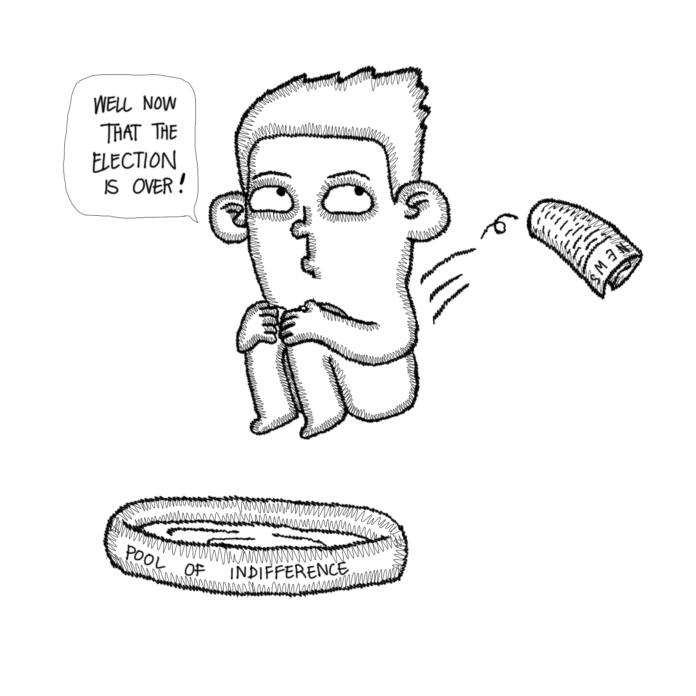We have posted memes featuring Donald Trump’s and Hillary Clinton’s faces. We have shared politically poignant articles. We have commented on our friends’ hot-button statuses — Liked, tweeted, repeated.
But the election season that has caused politically uninterested people to become engaged is now over. What does that mean for our political involvement? Just because Trump won the presidency doesn’t mean it’s time to become apathetic again. For those who were active in politics due to the presidential election – don’t let your news consumption dwindle.
Sure, the election was entertaining, and maybe that entertainment is what caused a spike in online activism. It’s no wonder so many people took to the web to share their opinions with the amount of fodder at hand. But all of those controversial issues that went viral, such as Trump’s gaffes and Clinton’s emails, will end up at the bottom of everyone’s news feeds in a matter of weeks and will subsequently fall off their radar.
It makes sense – it’s easy for those who didn’t want Trump to get elected, or who were dissatisfied with the presidential race as a whole, to become apathetic toward news. However, keeping up with local and state politics, as well as national and global issues, will make you a more informed voter come the 2018 senatorial and gubernatorial elections. Also, the closer elections are, the more watered down the news coverage becomes.
Harvard Kennedy School’s Shorenstein Center on Media, Politics and Public Policy reported that 56 percent of news media’s political coverage during the primaries was devoted to the “competitive game — the struggle of the candidates to come out on top.” In contrast, only 11 percent of coverage was devoted to the candidates’ “policy positions, their personal and leadership characteristics, their private and public histories, background information on election issues, or group commitments for and by the candidates.”
One way you can make up for the lack of policy information being shared is to read up on social issues when they are covered the most: in between elections. But consuming news that only confirms your bias will not make you the most educated voter. Though BuzzFeed makes entertaining videos in the off season, their political coverage definitely has its own sway. Seeking out publications like the Associated Press to get objective news instead allows you consider relevant issues from both sides – making you a more well-rounded voter. Not to mention, the best way to hold politicians’ feet to the fire is by having a comprehensive understanding of the issues at hand.
For Democrats, Republicans and everyone in between, it is important to not let elected officials go unchecked. Truly understanding the social issues your state’s gubernatorial or senatorial candidate will base their campaign on, such as immigration policy or education reform, will ensure you make an informed decision on who to support – whether that is by your vote or by volunteering.
And while these social issues may not directly affect you, there still remains groups of people that are affected. If not for elected officials, pay attention to the news for the sake of these minority groups – groups whose voices are silenced and suffocated by issues that receive more attention. A current example where individuals’ political and social activism influenced global media coverage is the protests at the North Dakota Access Pipeline. Garnering support from celebrities like Shailene Woodley and Mark Ruffalo, the pipeline protests now have people coming from other countries to stand in solidarity with the Standing Rock Sioux tribe. Politicians have had no choice but to respond.
Like voting, being aware of current events and cognizant of the concerns of the people around you is a civic duty. The election is over, but your participation doesn’t have to be. Stay informed for the future you want — one that is fair for others.






